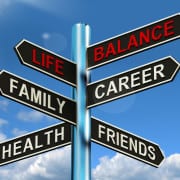The other side of work/life balance
Generally, when anyone discusses work/life balance in the context of lawyering, the assumption is that the focus is on the “life” part of the balance, because the “work” part comes with the turf. That’s usually quite true. But today, I’d like to examine the “work” part of the equation.
“[The law] is a jealous mistress, and requires a long and constant courtship. It is not to be won by trifling favors, but by lavish homage.” The Value and Importance of Legal Studies – Joseph Story, (1779-1845)
This quote is well-known for a reason: it’s true. The law isn’t a 40-hour a week job (at least, not for most practicing attorneys). I’m sure scores of writers have observed that our work is called a legal “practice” for a reason: we become good lawyers through practice, through trial and error (and, one hopes, correction), and through mentorship.
Many lawyers will tell you that their quickest professional growth occurred when they were working on a case or a deal that required hours upon hours, when their focus was riveted on work, when they saw sunrise and sunset from their office windows. Periods like that reinforce the truth that we have to work in the law to get skilled at it. There are no shortcuts.
Aside from those periods that occur in almost every lawyer’s life when life becomes work, there’s a balance to be found between work and non-work, and the price for getting out of balance is equally high regardless of which way the imbalance tips. To succeed in the law, it’s necessary to put in plenty of billable time.
On an average day, most people’s billing limit is somewhere in the range of 10 hours — and that’s for more senior attorneys who are able to maximize the billiable time yield from time spent in the office. (Brand new lawyers may have a ratio of nonbillable hours to billable hour of as much as 3:1.) Some increase in that limit is possible, whether it’s by ensuring a good night’s rest before every working day, by eating mostly lean proteins and fruits and vegetables, or by training the body through regular exercise — all tactics to increase energy. Exceeding your limitations on hours worked on a routine basis will result in reduced efficiency, so it’s a losing proposition long-term. The answers is to learn to be efficient and energetic in the office, so you can make the most of your hours there.
How’s your balance today?




Leave a Reply
Want to join the discussion?Feel free to contribute!